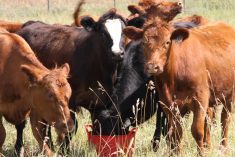The European Union has agreed to accept beef embryos until the end of December 2006.
With little warning last November, the EU decided to accept only embryos produced from IBR-negative bulls. Infectious bovine rhinotracheitis is a respiratory disease that causes abortions in cattle.
Canadians vaccinate their cattle for this disease as a whole herd health program so when tested, bulls appear positive. To fit the new rules, bull calves would need to be isolated and not vaccinated.
Doug McDermand of Alta Embryo Group near Calgary said EU countries raised enough complaints about the ban that the EU agreed to a moratorium until the end of next year. However, once IBR positive embryos arrive in a country, they cannot be moved to another country within the EU.
Read Also

Animal protection delivery to change in Saskatchewan
The Saskatchewan government is looking for a new agency to handle animal welfare after Animal Protection Services of Saskatchewan decided not to renew its contract next year.
“That would give people enough time to get the embryos into the country,” McDermand said.
“We are carrying on as usual, sending embryos to the U.K. and the EU.”
IBR-negative sired embryos may move among member states without restriction.
He said it is expensive to keep young bulls in isolation without vaccination and the EU beef market is not large enough to justify a huge effort.
“To get EU qualified semen is a very expensive process compared to producing semen for producing embryos.”
At a January meeting of the International Embryo Transfer Society in Copenhagen, Denmark, a statement was issued saying embryos from IBR- positive semen carried no risk of disease transmission.
“We issued a statement that there should be no restriction on the international movement of embryos based on the sero status of the donor bull,” said society member Larry Delvar of the Canadian Food Inspection Agency.
That recommendation was presented to the world animal health association, the OIE, and it is hoped this statement is considered during its annual meeting in May.
Existing research literature found no transmission of the disease using semen from IBR-positive bulls.















